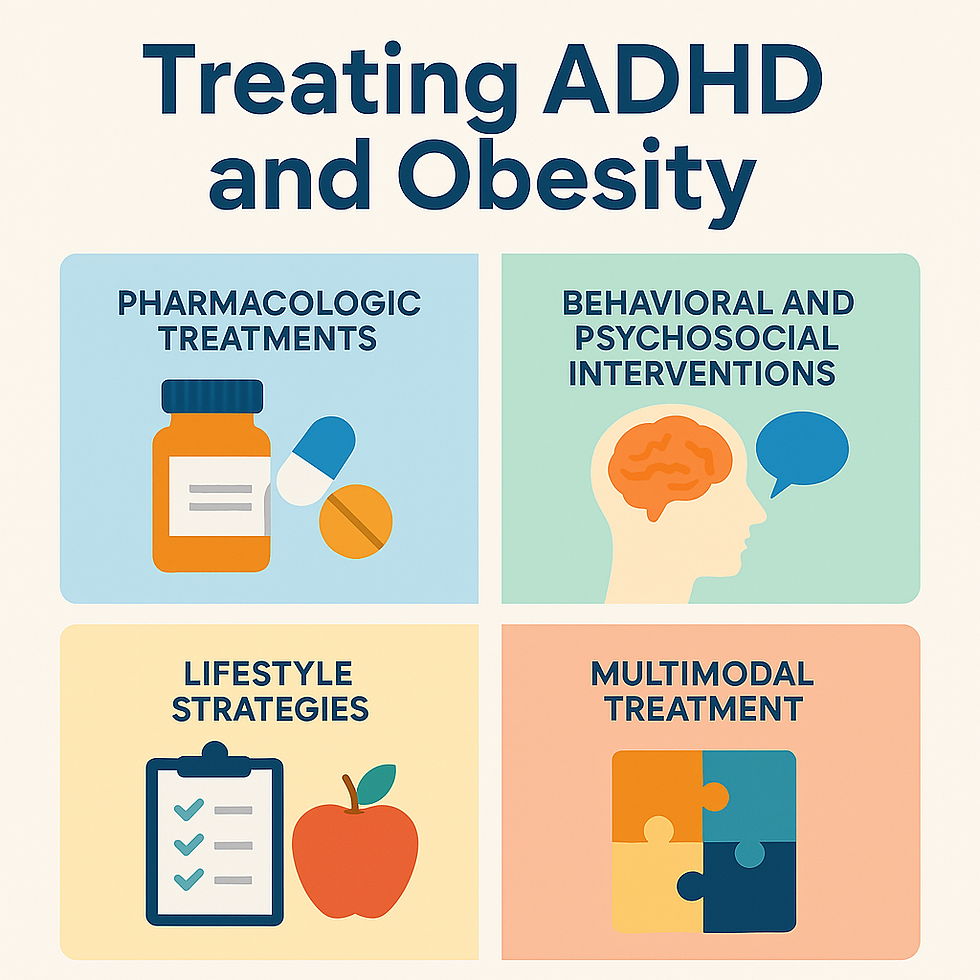ADHD and Obesity: Understanding the Overlooked Connection
- Marian Brock-Andersen
- Apr 11
- 4 min read

When you hear the words ADHD and obesity, you might not immediately think they’re related. However, research reveals a complex and often overlooked connection between Attention-Deficit/Hyperactivity Disorder (ADHD) and weight gain. This relationship frequently begins in childhood and can persist well into adulthood, even for those who are on prescription medication to treat the disorder.
ADHD and Obesity: A Two-Way Street
ADHD is a neurodevelopmental disorder marked by inattention, hyperactivity, and impulsivity. It affects about 5–7% of children and 2.5% of adults worldwide (Li et al., 2021). But its effects go far beyond focus or behavior—they can influence almost every aspect of life, including eating and sleeping habits, energy levels, and the ability to make decisions and follow through. A growing body of research shows that people with ADHD are at significantly higher risk of becoming overweight or obese.
Children with ADHD had 56% higher odds of obesity than their neurotypical peers. The risk was particularly high among boys, Asian and European children, and those not receiving ADHD medication (Zhao et al., 2023).
Children with ADHD often struggle with:
Impulsivity, leading to overeating or binge behaviors.
Sleep disturbances, which are known to increase appetite and cravings.
Emotional dysregulation, causing stress-eating patterns.
Difficulty maintaining physical activity routines.
The connection doesn't stop in childhood. The effects can compound over time.
Adult women with ADHD were more likely to report higher body mass index (BMI) and food addiction behaviors (Martinez-Gonzalez et al., 2021). Emotional eating, impulsive snacking, and trouble planning healthy meals are common struggles among adults with ADHD.
How ADHD Affects Food Choices
ADHD significantly influences eating behaviors through a combination of impulsivity, emotional dysregulation, executive dysfunction, and sensory processing differences. These factors can contribute to patterns like erratic eating, emotional overeating, and poor nutritional choices—raising the risk for weight gain and long-term health complications.
🔹 Impulsivity and Immediate Gratification
Craving fast dopamine boosts: High-sugar, high-fat, and ultra-processed foods are particularly appealing to individuals with ADHD, as they provide a quick surge of dopamine—something the ADHD brain often seeks.
Impulse eating: Many individuals snack frequently, overeat, or choose whatever is most accessible instead of planning balanced meals.
Poor portion control: Eating quickly or while distracted can lead to overconsumption, as internal cues of satiety may be ignored.
🔹 Inattention and Disorganization
Skipping meals: People with ADHD may forget to eat, especially during periods of hyperfocus or distraction.
Unstructured eating: Lack of planning often results in dependence on convenience foods, which are typically calorie-dense and nutrient-poor.
Misreading hunger cues: Emotional states like boredom, anxiety, or fatigue may be confused with hunger, leading to unnecessary eating.
🔹 Emotional Dysregulation & Sensory Sensitivity
Emotional eating: Stress, frustration, or sadness can trigger the use of food as a form of emotional self-soothing.
Rejection Sensitivity Dysphoria (RSD): Strong emotional responses to perceived criticism or failure can lead to comfort eating.
Sensory challenges: Many individuals with ADHD avoid foods due to their texture, smell, or appearance. This selective or picky eating is particularly common in children and may limit dietary variety.
🔹 Executive Function Challenges
Planning difficulties: Grocery shopping, preparing ingredients, and following multi-step recipes can feel overwhelming due to impaired executive function.
Forgetfulness: Individuals may forget what ingredients they have at home or miss essential steps in meal preparation, increasing reliance on packaged or fast foods.
The ADHD–Food Behavior Cycle
ADHD Symptom | Resulting Food Choice | Long-Term Effect |
Impulsivity | High-sugar snacks, fast food | Weight gain, energy crashes |
Inattention | Skipping meals, binge eating later | Irregular energy, disrupted metabolism |
Emotional Dysregulation | Comfort eating | Higher risk of emotional eating and obesity |
Executive Dysfunction | Lack of meal prep, poor planning | Increased reliance on processed or fast food |
Tips for Supporting Better Nutrition in ADHD
Strategy | Why It Helps |
🧠 Create structure | Regular meal and snack times help stabilize hunger cues. |
🥦 Prep simple meals ahead | Reduces decision fatigue and impulsive food choices. |
⏱️ Use timers/reminders | Encourages regular eating and hydration. |
🧊 Keep healthy snacks visible | Makes it easier to reach for nutritious options during cravings. |
📱 Use ADHD-friendly apps | Supports meal planning, grocery lists, and recipe organization. |
🧘 Treat co-occurring conditions | Addressing anxiety or depression improves emotional eating habits. |
What Helps Most?
The diet that you will stick with, is always the best option, but its strongly recomened to consider a high-protein, whole-food-based diet low in ultra-processed foods and simple sugars may offer the most consistent benefit for individuals with ADHD. This type of nutrition supports stable energy levels, improved mood, and better cognitive performance by maintaining balanced blood sugar and supporting neurotransmitter production (Ríos-Hernández et al., 2017).
Arnold, L. E., Lofthouse, N., & Hurt, E. (2012). Artificial food colors and attention-deficit/hyperactivity symptoms: Conclusions to dye for. Neurotherapeutics, 9(3), 599–609. https://doi.org/10.1007/s13311-012-0133-x
Li, Y., Wang, Y., & Zhang, S. (2021). Lifespan progression of ADHD: A systematic review of neurodevelopmental trajectories and transition to adulthood. Translational Psychiatry, 11(1), 120. https://doi.org/10.1038/s41398-021-01270-5
Martinez-Gonzalez, A. E., et al. (2021). ADHD, food addiction and obesity in adult women: A clinical exploration. Journal of Clinical Medicine, 10(22), 5312. https://doi.org/10.3390/jcm10225312
Nigg, J. T., et al. (2012). Meta-analysis of ADHD symptoms, restriction diet, and synthetic food color additives. J Am Acad Child Adolesc Psychiatry, 51(1), 86–97.e8. https://doi.org/10.1016/j.jaac.2011.10.015
Pelsser, L. M., et al. (2011). Effects of a restricted elimination diet on the behavior of children with ADHD (INCA study): A randomized controlled trial. The Lancet, 377(9764), 494–503. https://doi.org/10.1016/S0140-6736(10)62227-1
Ríos-Hernández, A., et al. (2017). The Mediterranean diet and ADHD in children and adolescents. Pediatrics, 139(2), e20162027. https://doi.org/10.1542/peds.2016-2027
Wolraich, M. L., et al. (2011). The effect of sugar on behavior or cognition in children: A meta-analysis. JAMA, 274(20), 1617–1621. https://doi.org/10.1001/jama.274.20.1617
Zhao, M., et al. (2023). Association between ADHD and overweight/obesity in children and adolescents: A systematic review and meta-analysis. Child Obesity, 19(4), 228–238. https://doi.org/10.1089/chi.2022.0190




Comments